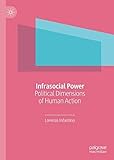Infrasocial Power [electronic resource] : Political Dimensions of Human Action / by Lorenzo Infantino.
Material type: TextPublisher: Cham : Springer International Publishing : Imprint: Palgrave Macmillan, 2020Edition: 1st ed. 2020Description: XII, 287 p. online resourceContent type: text Media type: computer Carrier type: online resourceISBN: 9783030450816Subject(s): Social sciences—Philosophy | Philosophy and social sciences | Political theory | Political sociology | Sociology | Social Theory | Philosophy of the Social Sciences | Political Theory | Political Sociology | Sociological TheoryAdditional physical formats: Printed edition:: No title; Printed edition:: No title; Printed edition:: No titleDDC classification: 300.1 LOC classification: H61-H61.62Online resources: Click here to access online
TextPublisher: Cham : Springer International Publishing : Imprint: Palgrave Macmillan, 2020Edition: 1st ed. 2020Description: XII, 287 p. online resourceContent type: text Media type: computer Carrier type: online resourceISBN: 9783030450816Subject(s): Social sciences—Philosophy | Philosophy and social sciences | Political theory | Political sociology | Sociology | Social Theory | Philosophy of the Social Sciences | Political Theory | Political Sociology | Sociological TheoryAdditional physical formats: Printed edition:: No title; Printed edition:: No title; Printed edition:: No titleDDC classification: 300.1 LOC classification: H61-H61.62Online resources: Click here to access online 1. Society and Power -- 2. The reshaping of man and the birth of totalitarian power -- 3. The conditions enabling individual choice and the limitation of power -- 4. Pareto and Machiavellianism: the problem and the errors -- 5. Voluntary cooperation and unlimited democracy.
Building from the level of individual interaction, this book intends to shed light on what the author terms "infrasocial power" and the relation between this individual-actor oriented level and public power. In overviewing the origins of power, the author allows for the disaggregation of the social fabric, thus making it possible to: 1) isolate the “sequence” in which the phenomenon of superordination and subordination materialises; 2) identify the institutional “instruments” which can be used to limit infrasocial power; 3) discriminate between a social position achieved through engagement with others (and what we are capable of doing for them) from one occupied by means of force and deception; 4) explain the birth and function of public power; and 5) analyze the consequences produced by different political regimes.
